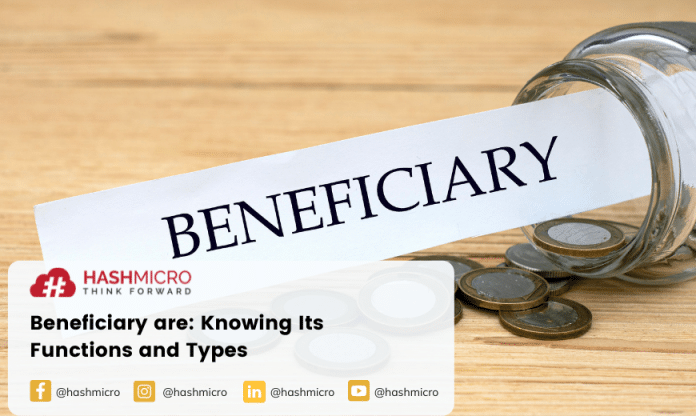Everyone could have the opportunity to be a beneficiary. Whether it is an individual or corporate entity, both have the same rights as this party. In some public services, the beneficiaries are not new. The beneficiary is of a party whose financial advantages, such as an insurance policy, an inheritance, or a trust fund.
However, its existence has so far been context-specific of services such as insurance, L/C, banking, and accounting. To be clear, we will be presenting a function and the types in this article. So if one day you are going to be at such a party you will no longer need to experience confusion when running it. If your company still manages assets manually, we recommend using Asset Management Software to make it easier to manage your new assets when one day you become a beneficiary.
Table of Content:
Table of Content
The Function of the Beneficiary
A key function of the beneficiary is as one who has the right to benefit from the trust, will, or insurance policies. Thus the designated party will either accept the payment of the insurance company or can take ownership of the assets turned over to them on the basis of trust or a will.
Usually, in this case, there is an increased responsibility or duty for the beneficiaries based on the type of assets they receive later. For example, recipients must handle any taxes including debts based on what they have received.
Moreover, the beneficiary must meet all the requirements listed in the trust document when it is to benefit. For example, the beneficiary has the primary objective of scholarship education funding. To ensure that all such funds are used for their original purpose, the giver usually requires that the recipient attend college before receiving the funds.
Also read: What is assessment? Definition, Function, Type, and Purpose
The Party that Became the Beneficiary
As is the preliminary explanation that anyone, both individuals and organizations can be the beneficiary. It can refer to a spouse, child, friend, charity, trust fund, or inheritance as beneficiaries. However, some states known as the property states do not allow non-couples to be recipients of an insurance policy without their spouse’s consent.
For these countries, the possession of all the property owned by a couple is therefore considered to be the common property, so the value of an insurance policy is legally the property of the couple as well. This restriction does not exist in the state of non-community property. There are also limits to the beneficiary’s ability to receive benefits from trust or insurance policies.
For example, if you refer to a child as the beneficiary of an insurance policy, it can cause new problems when you die when the child is underage. Because insurance companies don’t make insurance payments to minors. Then the court must appoint a guardian so the police can be paid to the child as a beneficiary. Of course, this would require considerable expense and time, and it could reduce the value of police pay.
Another problem may also occur if the beneficiary is legally unable to do so. This can happen if a doctor’s diagnosis proves that the beneficiary is incompetent from the mental side which makes it difficult to care for himself.
Also read: 5 Tips for Choosing the Right Public Liability Insurance
Choosing Who Is the Beneficiary
You can usually select or appoint beneficiaries when applying for a member of an insurance policy or writing a will. Then you will be asked to write down the complete information of the beneficiary, starting with your identity, address, contact, and relationship in the document.
Not only that, the contents of an inheritance document or a guardianship will also usually describe the terms of the trust, restrictions on how beneficiaries can use their assets, and trustees who will manage that trust. If you have established those who will be beneficiaries, change or even change your name at any time.
However, the process for changing beneficiaries will vary from one insurance company to an insurance company. By using Document Management Software, you no longer need to bother managing company documents, including beneficiary documents.
The Types of Beneficiaries

Primary Beneficiary
The primary beneficiary of benefits of this type appears in the interests of the party are higher than the others. So the person who becomes the primary beneficiary and you can decide for yourself. So her position is the top priority for receiving claim payments from insurance or beneficiaries. The most important reason was that it was designated by the individual who registered the service.
Contingent beneficiary
The contingent beneficiary is a descendant of the primary recipient who is also a secondary recipient. Only when the main beneficiary has passed away will such benefits result in a handover to the secondary beneficiary. This secondary receiver is determination to overcome the unexpected. Usually, life insurance will allow you to fill in some beneficiaries just in case.
Beneficiaries that are revocable and irrevocable
Both the appointment of the revocable beneficiary and the irrevocable beneficiary are optional. This party can determine right from the outset whether a party will benefit or not at all.
On the type you can cancel, meaning you can change who the beneficiary is at any time. But for the type you can’t cancel, of course, the beneficiaries are just the ones in the beginning, so there is no authority to change.
Also read: Definition, Benefit, and Games Examples for Ice Breaking
Conclusion
That’s an explanation of the beneficiary starting from the function to the types. Basically, a beneficiary is a beneficiary or a party who benefits in the financial sector, such as insurance policies, inheritance, trust funds, and other assets. Talking about benefits, all of the stakeholders in your company should get any benefits from their company.
Usually, a company can give a lot of benefits, like insurance, profit-share, holiday tickets, scholarships, and etc. Many benefits that the company should manage, so that the company can use an ERP System to handle it automatically. One of them is to have an HRM system that can help you and your company in managing beneficiaries for all employees. Free demo, now!



































